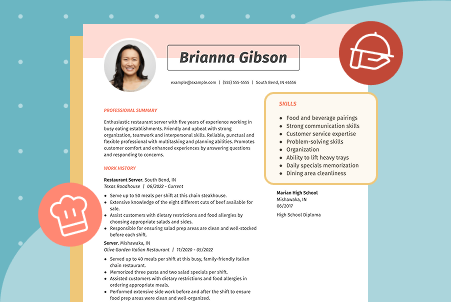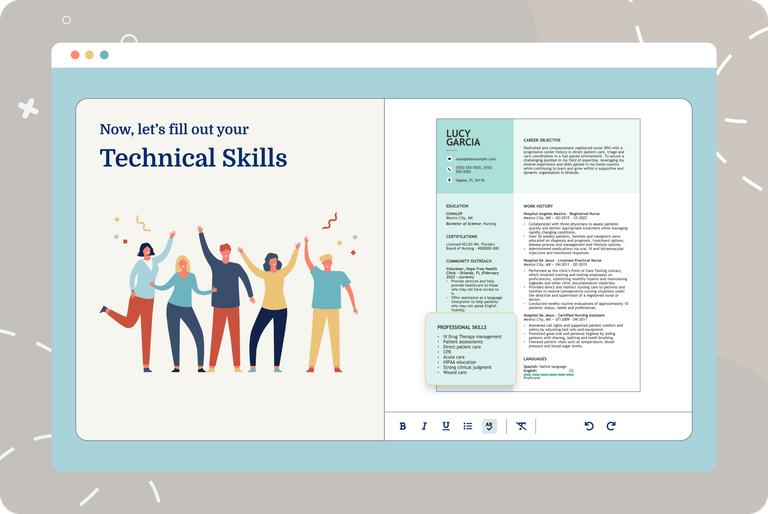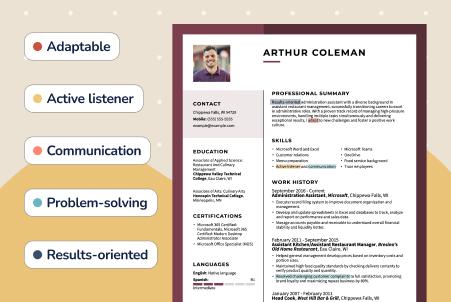Food Service Skills for a Resume (Examples & Tips)

Our customers have been hired at: *Foot Note
Success in the food service industry hinges on more than just what’s on the plate. Behind every satisfied customer is a skilled professional who knows how to juggle multitasking, teamwork, communication, and a dash of grace under pressure.
Food service skills are the backbone of hospitality, turning a simple meal into a memorable experience. In this article, we’ll explore the essential food service resume skills your application needs along with certifications and tools key to elevating your career.
What Are Food Service Skills?
Food service skills are the abilities and qualities needed to effectively prepare, serve, and manage food and customer experiences in a dining or hospitality setting.
Here are six basic skills for food service workers you can include when crafting your resume:
- Customer service: Waiters, hosts, and cashiers need customer service skills to interact with guests in a friendly, helpful, and professional manner to ensure a positive dining experience.
- Communication skills: Effective communication involves clearly conveying information between team members and customers, whether taking orders, giving instructions, or resolving issues.
- Teamwork: Collaboration with coworkers in fast-paced environments keeps service smooth and efficient.
- Multitasking: Handling multiple responsibilities simultaneously, such as taking orders, delivering food, and restocking supplies without sacrificing quality is key to a smooth-running establishment.
- Attention to detail: Detail-oriented workers ensure accuracy in orders, cleanliness, food presentation, and following safety and hygiene standards.
- Time management: Strong time management skills allow workers to prioritize tasks and work efficiently to meet customer needs and keep operations running on schedule.
Here’s an example of a resume with an effective food service skills list:
See the following pages for additional samples on how to list food service skills for different roles:
Food Service Skills Examples
Below are food service resume skills examples to help you elevate any dining experience.
Food service hard skills
Hard skills are specific, teachable abilities that are typically gained through education, training, or hands-on experience.
Here are a few examples of hard skills for food service to include on your resume:
- Food safety and sanitation: Understanding and applying proper hygiene, storage, and handling practices to prevent foodborne illness and ensure a clean work environment
- Food preparation: Performing tasks such as measuring, mixing, cooking, and assembling dishes according to recipes and quality standards
- Knife skills: Using knives safely and efficiently for tasks like chopping, slicing, dicing, and filleting to maintain speed and consistency
- Menu knowledge: Being familiar with the ingredients, preparation methods, and allergens in menu items to answer customer questions and make recommendations
- Order-taking and point-of-sale (POS) systems: Accurately entering orders and processing payments using digital registers and software systems
- Beverage preparation: Preparing and serving drinks, including coffee, cocktails, or soft beverages, with attention to detail and presentation
- Inventory management: Tracking, ordering, and organizing food and supply stock to ensure items are available and reduce waste
- Cash handling: Managing transactions, giving correct change, and balancing cash drawers with accuracy and honesty
- Table setting and presentation: Arranging tableware and serving dishes to match the restaurant’s standards and enhance the guest experience
- Cleaning and maintenance: Keeping kitchen and dining areas clean, sanitized, and well-maintained to meet health and safety regulations
Food service soft skills
Soft skills are personal attributes and interpersonal abilities that enable individuals to interact effectively and harmoniously with others.
Here are some examples of soft skills for food service workers:
- Problem-solving: Thinking quickly and creatively to resolve issues like incorrect orders or customer concerns while maintaining service quality
- Adaptability: Adjusting smoothly to sudden changes, such as a busy rush, staff shortages, or menu updates, without losing efficiency
- Stress management: Staying calm, focused, and productive in fast-paced or high-pressure environments like a full dining room or busy kitchen
- Empathy: Understanding and responding to the needs and emotions of customers and coworkers with patience and care
- Conflict resolution: Handling disagreements professionally and diplomatically to maintain a positive and respectful workplace
- Work ethic: Demonstrating reliability, dedication, and a strong sense of responsibility to deliver consistent, high-quality service
- Initiative: Taking proactive steps to improve service, solve problems, or help the team without being asked
- Active listening: Fully focusing on what others are saying to ensure clear understanding and avoid mistakes
- Professionalism: Maintaining a respectful attitude, appropriate appearance, and courteous behavior in all customer and team interactions
- Cultural awareness: Respecting and adapting to the diverse backgrounds and preferences of guests and coworkers in a multicultural work environment
Food service technical skills
Technical skills are the specialized, practical abilities and knowledge needed to perform specific tasks or operate tools, equipment, or technology in a given field.
Here are 10 technical skills for food service workers:
- Cooking techniques: Applying methods such as grilling, sautéing, baking, and steaming to prepare food to proper temperatures and textures
- Food safety compliance: Following health codes and regulations for food handling, storage, and sanitation to ensure customer safety
- Plating and presentation: Arranging food appealingly and consistently to enhance the dining experience and reflect the restaurant’s standards
- Equipment operation: Operating kitchen machinery like ovens, grills, dishwashers, and mixers efficiently and safely
- Sanitation and cleaning procedures: Maintaining cleanliness of kitchen and dining areas using correct methods and supplies in compliance with hygiene standards
- Allergen awareness: Identifying common food allergens and ensuring meals are prepared and served safely to avoid cross-contamination
- Recipe execution: Accurately following recipes, portion sizes, and preparation methods to maintain consistency and quality
- Table setting protocols: Properly arranging utensils, glassware, and dishes for various dining styles, including formal and casual service
- Food labeling and storage: Labeling and storing food items according to safety guidelines to maintain freshness and prevent spoilage
- Buffet and banquet service: Setting up, maintaining, and breaking down buffet or catering setups while ensuring food safety and presentation
How to Improve Your Food Service Skills
Improving food service skills requires training, practice, and ongoing development. Here are some tips to enhance your food service skills:
- Seek training opportunities: Take advantage of training programs, workshops, and courses offered by employers, culinary schools, or industry organizations.
- Practice regularly: Experiment with new recipes, techniques, and ingredients to expand your repertoire and refine your abilities.
- Observe others: Pay attention to how they interact with customers, handle challenging situations, and maintain high standards of quality and service.
- Cross-train: To increase your versatility, take advantage of opportunities to cross-train in different roles or departments within the food service establishment.
- Attend workshops and seminars: These events provide valuable insights, networking opportunities and hands-on learning experiences.
Try our AI Resume Skills Generator to take the guesswork out of choosing food service skills for your resume.
AI Resume Skills Generator

How to Highlight Food Service Skills on a Resume
The key to showcasing your food service skills is weaving them into every section of your resume. Follow these tips to convince hiring managers you have what it takes:
- Create a dedicated skills section: Dedicate a section of your resume specifically to your food service skills. Your resume skills section should be prominently placed near the top of your resume and formatted with bullet points for easy scanning.
- Use relevant keywords: Use keywords from the job description and industry-specific terminology in your skills section to pass applicant tracking systems (ATS) and impress hiring managers.
- Add skills to your resume summary: In your resume summary, feature two or three skills that are highly relevant to the job description, such as excellent customer service and efficient food preparation.
- Quantify your skills: Whenever possible, use quantifiable achievements to provide concrete examples of your skills. For example, “Implemented a new upselling strategy for appetizers, resulting in a 15% increase in appetizer sales over a three-month period."
- Provide concrete examples: In your work history section, provide examples or achievements that demonstrate your skills in action.
- Use action verbs: Start each bullet point under your work experience with strong action verbs to convey your achievements effectively. For example, "Prepared and plated gourmet dishes according to established recipes and presentation standards."
Browse our professionally written resume examples to see how other job seekers spotlight their strongest skills.
Common Tools and Technologies Used in Food Service
In food service roles, various tools and technologies are used to facilitate operations, streamline processes, and enhance efficiency. Here are some common ones:
- Point-of-sale (POS) systems: POS systems process orders, manage transactions, and track sales data.
- Kitchen equipment: This includes a wide range of tools and appliances used for food preparation, such as ovens, stovetops, grills, fryers, mixers, and food processors.
- Food safety tools: Thermometers, temperature probes, and sanitizing equipment are essential for ensuring food safety and compliance with health regulations.
- Cutlery and kitchen utensils: Knives, spatulas, tongs, ladles, whisks, and other utensils are used for cutting, flipping, stirring, and serving food.
- Cookware and bakeware: Pots, pans, baking sheets, and other cookware are necessary for cooking and baking a variety of dishes.
- Cleaning equipment: Brushes, sponges, scrubbers, mops, and cleaning chemicals are essential for maintaining cleanliness and sanitation in the kitchen and dining areas.
- Menu display boards: Digital menu boards or chalkboards display menu items, specials, and promotions to customers.
Best Food Service Certifications
There are several food service certifications that can enhance your resume and demonstrate your expertise and commitment to excellence in the industry, such as:
When selecting certifications to include on your resume, consider the requirements of the job you're applying for and choose certifications that align with the role and demonstrate your relevant skills and expertise.
We recommend using one of our professional resume templates to ensure your food service resume follows industry standards and ATS best practices.
Key Takeaways
- Food service skills refer to specific abilities that ensure a dining establishment runs smoothly and provides an excellent customer experience.
- Food service workers have a wide range of skills, from customer service and problem-solving to food preparation and cash handling.
- You can feature your food service skills throughout various sections of your resume, providing concrete examples of how you’ve developed and demonstrated those skills.
- You can improve your food service skills by attending relevant workshops and seminars, practicing regularly, and observing others in similar roles.
FAQ
What skills do you need to work in food service?
Working in food service requires a combination of technical skills, interpersonal abilities, and personal qualities to provide excellent service and ensure customer satisfaction.
Clear and effective communication skills are also essential for conveying orders, listening to customer preferences, and collaborating with coworkers in a fast-paced environment.
Knowledge of food safety regulations, proper food handling, and storage and sanitation practices are critical to prevent contamination and ensure the safety of customers and staff.
How do you put food handling on a resume?
When putting food handling skills on a resume, it’s important to highlight your knowledge of food safety principles and your experience in handling food safely.
Include a dedicated “Skills” or “Core Competencies” section on your resume, and list “Food Handling” as one of your skills. This signals to employers that you have expertise in this area.
Provide specific examples of your experience in food handling, such as preparing ingredients, storing food properly, and following sanitation procedures.
See our catering server resume example to see how to effectively include food handling skills on your resume.
What are the main skills needed in food preparation?
In food preparation, several key skills are essential to ensure dishes are cooked safely, accurately, and to high standards of quality. Here are the main skills needed in food preparation:
- Knife skills
- Cooking techniques
- Temperature control
- Flavoring and seasoning
- Food safety and hygiene
- Recipe adherence
- Attention to detail
Mastering these skills enables professionals to consistently produce high-quality dishes that meet customer expectations and contribute to the success of the culinary operation.
What skills do you need to be a food service manager?
To be a successful food service manager, you need a diverse skill set encompassing both technical expertise and strong leadership abilities.
Here are a few food service manager skills examples:
- Team management: Ability to manage and coordinate a team of kitchen staff, servers and other employees, including scheduling, training, and performance management
- Menu planning and cost control: Skill in developing menus, pricing strategies, and cost-control measures to maximize profitability while maintaining quality
- Strategic planning: Ability to develop long-term goals and strategies to drive business growth, expand customer base, and enhance overall performance
- Regulatory compliance: Knowledge of labor laws, health and safety regulations, and licensing requirements to ensure compliance and minimize legal risks
See our food and beverage manager resume examples for additional guidance.
Our customers have been hired at:*Foot Note








